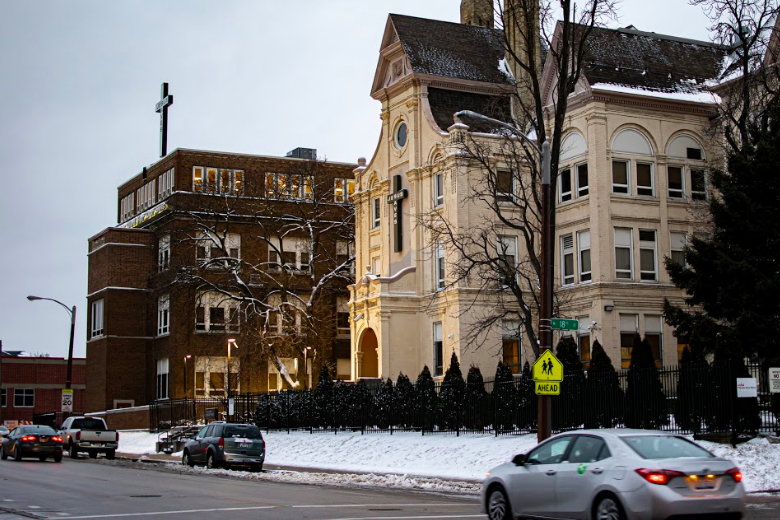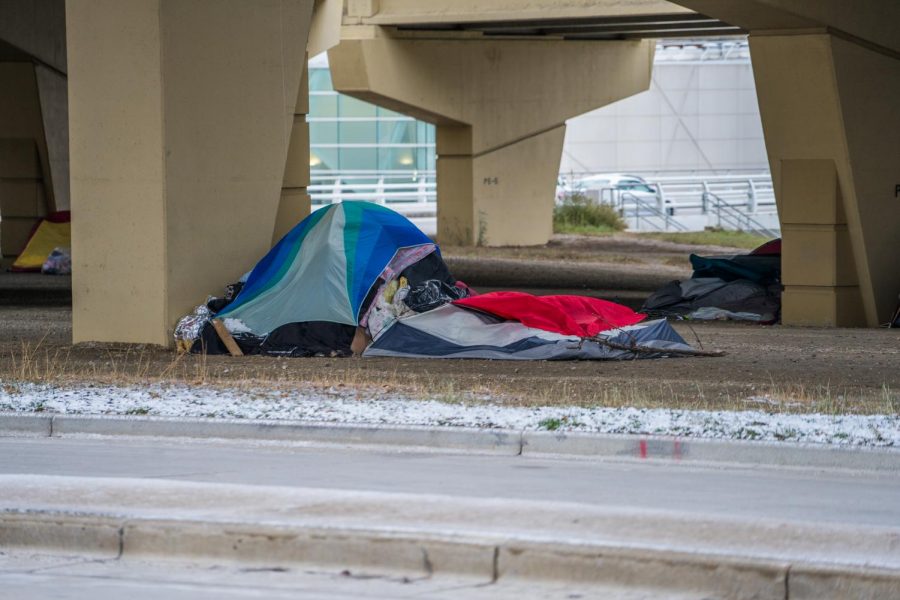The homeless are at a great risk during the COVID-19 pandemic, often staying in crowded locations and without resources for sanitation and protection.
The Centers for Disease Control and Prevention listed resources on its website for the homeless population, but the struggle remains. Resources included guidelines for reopening shelters and testing and training for shelter workers.
“Some people who are experiencing unsheltered homelessness may be at increased risk of severe illness from COVID-19 due to older age or certain underlying medical conditions, such as chronic lung disease or serious heart conditions,” the guide said.
The CDC encouraged social distancing but noted that this may be especially difficult when people are gathering to access different supplies such as food, water and hygiene products.
“Lack of housing contributes to poor physical and mental health outcomes, and linkages to permanent housing for people experiencing homelessness should continue to be a priority,” the guide said. “The balance of risks should be considered for each individual experiencing unsheltered homelessness.”
Milwaukee Rescue Mission, a religious shelter, has programs for men, women, children and families. Its mission revolves around caring for those poor in mind, body and spirit by sharing God’s love, according to its website.
“There is already some evidence that various types of inequality are increasing from the pandemic, and this would be in line with the effects of past pandemics,” Roberta Coles, a professor of social and cultural sciences, said in an email.
Coles said that COVID-19 has taken advantage of existing inequalities that have been around for over 50 years.
She also mentioned that many minority populations, including African Americans, Latinos and indigenous peoples, are heavily impacted by coronavirus, with more working essential jobs, less access to healthcare and a higher likelihood of living in multigenerational households.
“They have experienced higher case and death rates of COVID,” Coles said. “That means they will also face higher medical bills. Combine that with lessening ability to pay rent and mortgages, and the growing possibility of eviction, we could likely see an increase in homelessness.”
Additionally, Coles said she has noticed more people begging for food or money on the streets, which is in line with what research shows would happen.
Patrick Kennelly, director of the Marquette Center for Peacemaking and a member of subcommittee on homelessness concerns, said that factors related to age and underlying medical conditions make the homeless more susceptible to the threat of the virus.
“COVID-19 has presented a unique set of challenges for individuals experiencing homelessness and the organizations and people that seek to address these issues,” he said.
To help mitigate the spread of the virus, Kennelly said the Near West Side Partners, along with other organizations, have hosted supply drives to assist shelters.
“This has enabled shelters and agencies to provide PPE as well as to implement different policies, including social distancing measures, to protect those most vulnerable,” he said.
However, Kennelly said that Milwaukee has been troubled for a long time before the pandemic hit.
“Even before the current pandemic, Milwaukee faced enormous challenges and inequalities, including poverty, racism, unequal access to resources, and trauma,” he said. “While many in Milwaukee have demonstrated resilience in confronting these inequities, vulnerable communities have been disproportionately impacted by the effects of COVID-19.”
He said that Marquette students have the chance to be a help out the more immediate problem of homelessness while learning about the underlying issues that Milwaukee faces.
“At Marquette and in Milwaukee, there are a large number of people working directly on food and housing insecurity and homelessness issues,” Kennelly said.
Kennelly said students looking to get directly involved can begin by volunteering with the Center for Community Service and Midnight Run.
One group at Marquette working to help the city’s homeless population is the Marquette University Police Department. Officer Gary Bray has run the homeless outreach program for the last five years. The program consists of about four officers that go through various training with the Milwaukee Police Department.
Bray said that he tries to collect items for the homeless, such as sleeping bags and various products, in case he is unable to refer someone to a place that can help them immediately.
“If we can’t get somebody housed, I’ll try to keep a stash of sleeping bags,” Bray said. “If they need any kind of hygiene products, in winter we’ll keep them in our squad car.”
Bray also said that the city of Milwaukee has set up many homeless people in hotels that have shut down because of the virus as a way to slow the spread and protect people. For example, he said that about 43 people were housed at the Ambassador Inn.
The Guest House, located just north of Marquette’s campus on 13th Street, is Milwaukee’s largest publicly funded homeless shelter. It provides shelter and programs for homeless men, including veterans and recovering individuals, has also been working to help the homeless during the pandemic.
This homeless shelter is program-based, differing from the common perception of homeless shelters with lines out the front door, Amy Rowell, director of development, said.
Rowell said that some public places and meal sites may have closed, but the needs of Milwaukee’s homeless have not budged as they face continued and increased hardships during this pandemic.
The Guest House is asking for nonperishable foods, hygiene and safety supplies, essential clothing items and activity supplies, such as adult coloring books and puzzles.
“We have been slowly resuming some of those engagements but haven’t yet resumed within-building volunteering,” Rowell said. “Our number one priority is resuming our internship placement.”
Rowell said they get volunteers from local colleges, such as Waukesha County Technical College, and hope to resume their internships as quickly as possible.
“We have definitely seen an increase in inquiries and awareness of community knowing we need more and different things,” she said. “The community sees basics needs are a priority and people are responding.”
She said donations have been very well received. The Guest House has an Amazon Wishlist that some community members have been consulting, and has also been putting out calls for donations through social media.
The Homeless Research Institute also said that 23% of the homeless population is over the age of 50 and thus at greater risk for catching the virus.
“Though we don’t have good numbers on the homeless, we already know that homeless populations are being affected in various major cities,” Coles said, citing Boston, Seattle, San Francisco and Atlanta as examples. “The homeless (and the staff) in shelters may be at more risk than those who live on the street and outdoors, though this will change when cold weather sets in.”
In March, the Guest House immediately transitioned half of its approximately 100 staff to remote work, and those whose work required them to be on-site had staggered shifts to maximize distancing, Rowell said.
They also broke the meal service into two shifts, transitioned one of their dorms into an isolation area in case clients test positive and moved volunteering outdoors after a brief hiatus.
“To our knowledge, we haven’t had any spread within the shelter,” Rowell said. “We did have a few individuals with symptoms but no positive cases.”
The Guest House’s total building capacity is 86 adult men. However, as clients have left their programs, Rowell said they have been cautious in refilling spots, without turning clients away, to maintain better social distancing. They also shifted beds in the dorms to alternate direction, maximizing distance between clients’ heads when they sleep.
“We were so diligent and so forward-thinking early on, even requiring mask-wearing within the building before the mandate,” she said. “What has always been important to us is not only being client-centered but also person-centered – employees and volunteers as well. We knew if we were going to offer PPE, it would be to staff and clients equally.”
Rowell, a Marquette graduate, said she appreciates that Marquette is mission-driven and looks at the big picture. She says that it is important to know that homelessness doesn’t mean someone is lazy and taking advantage of the system.
She urged people to have more compassion and think more broadly and said there might be a shift in the face of homelessness because of the pandemic’s economic impacts.
“Things are going to get worse and will require more innovative approaches,” Rowell said. “At Guest House, we are ramping up our prevention and outreach programs to meet people in the community with a goal of avoiding shelter stays … if all goes according to plan, we will be able to keep people housed or transition them to alternate housing – all while avoiding actual homelessness or shelter stays.”
This story originally ran in the summer journal and has since been updated.
This story was written by Shir Bloch. She can be reached at [email protected].


